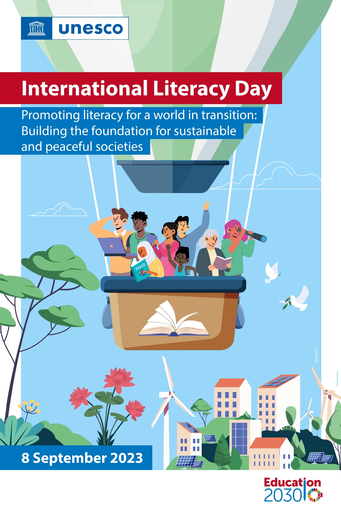Almost a month ago, on the 8th of October, the International Literacy Day took place. Even today, more than 750 million adults are thought to be illiterate. This is concerning because literacy is essential for creating a society where everyone has access to the knowledge needed to live honourably and independently. Additionally, it is impossible to imagine reaching the Sustainable Development Goals without guaranteeing that everyone can read and write, as this is what allows them to become self-sufficient and stand on their own two feet. Furthermore, we must remember that the world we live in today is digital. Accordingly, digital literacy is just as important for the advancement of any society as conventional literacy.
Since the SDGs entered into law in 2016, which means we are halfway to the suggested 2030 target, this year is particularly significant. Are we headed in the right direction? According to a recent UN report, among other things, the COVID-19 pandemic’s effects and climate change are preventing goals from being reached as quickly as one may anticipate. The SDG4 on education is no exception in this regard. As a result, the theme of this year’s UNESCO conference in Paris was “Promoting literacy for a world in transition: Building the foundation for sustainable and peaceful societies”. In two different panels, a number of expert speakers from around the world presented their insights: 1. Enhancing governance and financing of literacy for peace and sustainable development, and 2. Effective programmes, contents and practices for unleashing the transformative power of literacy for sustainable and peaceful societies.

UNESCO International Literacy Prices
The UNESCO International Literacy Prizes 2023 Award Ceremony marked the end of the conference. Today, we’ll concentrate on the Snapplify Africa e-Library project, which encourages literacy in mother-tongue. This is an illustration of how ICTs may aid in development initiatives.
“The Africa e-Library project at Snapplify was born from the urgency to tackle two major challenges. Firstly, the project recognized the immense linguistic diversity across the globe and the resulting difficulties in accessing digital educational resources. Snapplify aimed to create a solution that could provide educational content in multiple languages, making learning accessible to a wider audience”.
The e-Library is a fantastic tool for teachers to exchange resources that are accessible to students 24 hours a day in 11 different African languages. We became aware of the value of online learning as a result of the COVID-19 pandemic, making Snapplify a crucial tool for effective learning. Currently, this technology is being used by more than 3 million students, and the company is already striving to make it available to all African learners by collaborating with NGOs and local governments, among other entities. The tool’s inclusion of text-to-speech and dyslexia typography, which promote and guarantee inclusive education, should also be emphasised.
How useful is a conference in raising awareness of the importance of literacy?
International specialists discussed funding, the effectiveness of various initiatives, recommendations for improvement, and other topics during the UN event honouring International Literacy Day. It was held in a governmental setting and was not particularly open to the general public, other than it being broadcasted live. It is obvious that such conferences are required to inform governments and other institutions about the viability of various initiatives and to present feasible solutions. But perhaps other kinds of events might be more effective in spreading the word about how important literacy is?
Apart from the UNESCO conference, many other events took place around the world in order to celebrate the day and raise awareness of the importance of literacy. The majority of the events were conferences with speeches by professionals, diplomats, etc. I believe this format fails to reach the people, which makes it hard for them to engage in these significant days and, as a result, hard for them to understand the value of literacy. However, I would like to draw attention to a few events that took place at a gathering in Uganda, including a literacy walk, youth-led panel discussions, and puppet reading performances. Additionally, in Gambia, the festivities included poetry readings and singing in the local tongues and were preceded by a popular event, such as a parade or sporting event. I believe that by involving people in these types of celebrations, the necessity of literacy can be more understood, and people will feel like they are contributing to the issue.
I believe it is vital that organisations like UNESCO recognise and honour initiatives like Snapplify since it suggests recognition for the work done to establish ideas that aid in the social, cultural, and personal development of all people, particularly those who most need it. In addition, I think it is crucial to use digital tools to address issues like illiteracy in the world we live in today. However, I believe there should be more initiatives that involve regular people in this process of awareness of the importance of literacy in both societal and personal development.
What do you think about this award-winning project? Did you take part in any events to celebrate International Literacy Day? Do you know of any other initiatives?

